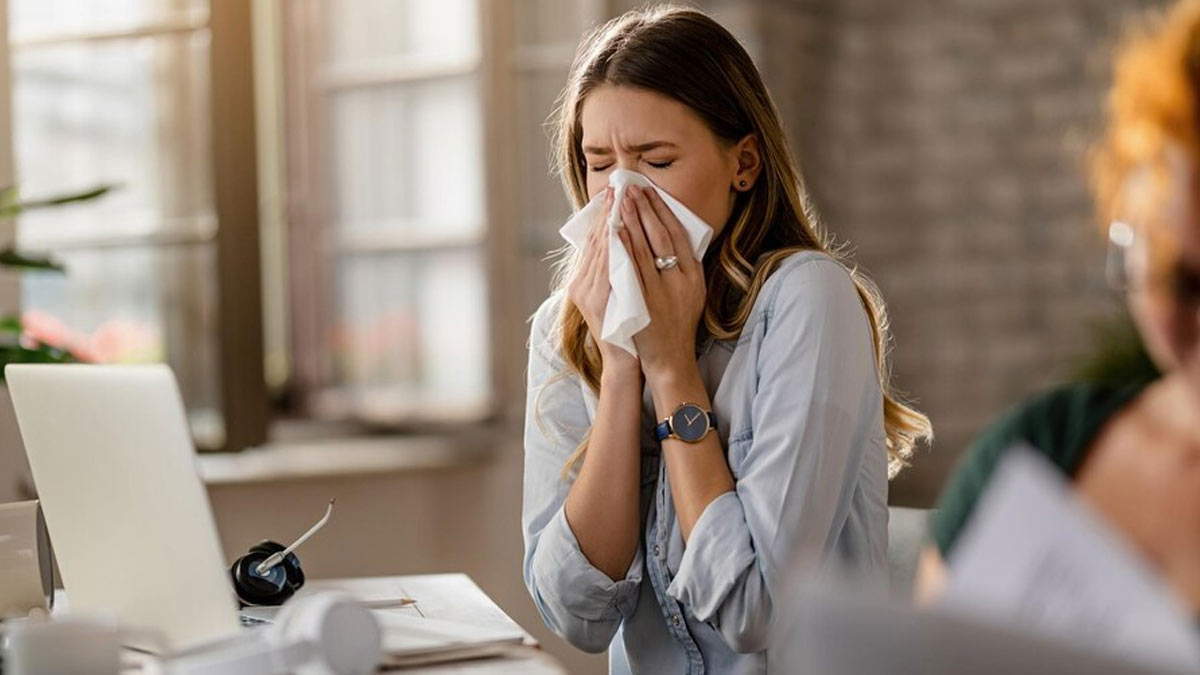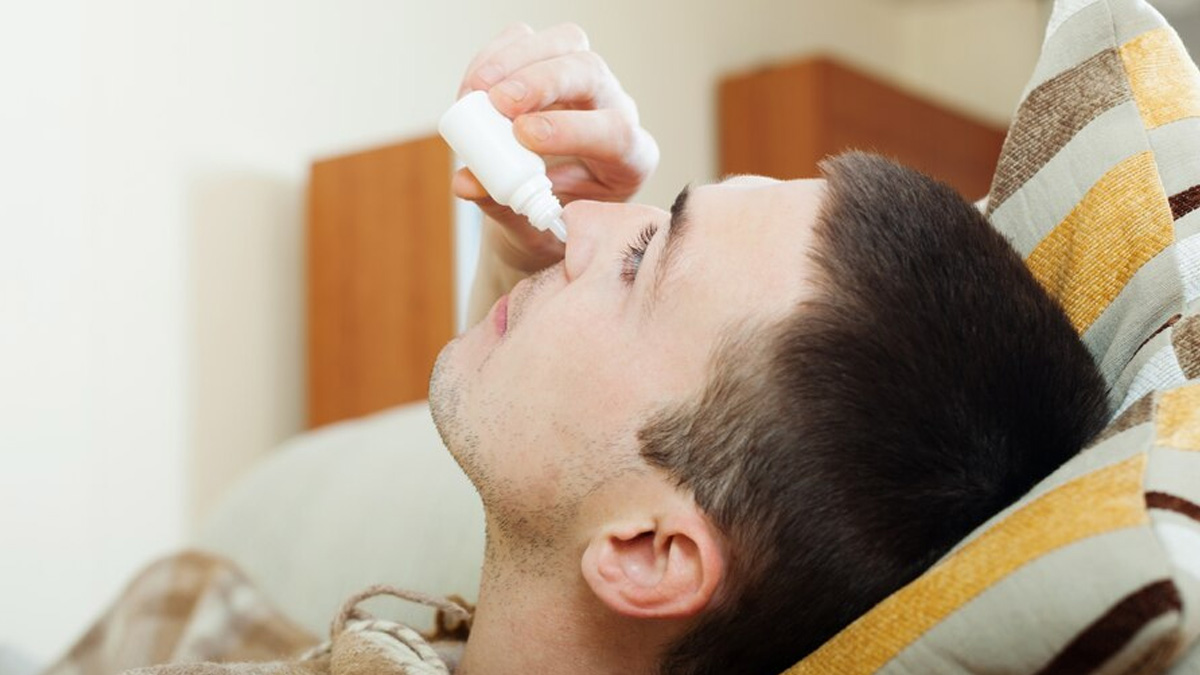
Allergic rhinitis, commonly known as hay fever, is a condition that affects millions of people worldwide. It occurs when the immune system overreacts to environmental allergens, such as pollen, dust mites, pet dander, or mould. This reaction causes inflammation in the nasal passages, leading to a range of uncomfortable symptoms.
Table of Content:-
To uncover the symptoms, treatment, and home remedies of allergic rhinitis or hay fever, the Onlymyhealth team spoke to Dr Niveditha Damodharan, ENT, Head and Neck Surgeon, Apollo Spectra Hospital, Bangalore and Dr G Krishna Mohan Reddy, Consultant Physician and Diabetologist, Yashoda Hospitals, Hyderabad.
Symptoms of Allergic Rhinitis
As per researchers from the University of Mississippi Medical Centre, approximately 20% of the world’s population has allergic rhinitis. They said that the chances of hay fever are higher in people with asthma, eczema, or a family history of asthma or allergic rhinitis.

As per the two experts, the symptoms of allergic rhinitis can vary in severity from person to person. Common symptoms include:
Nasal Symptoms
The most affected target of allergic rhinitis is the nasal passage:
- Sneezing: Frequent and uncontrollable sneezing.
- Runny Nose: Clear, watery discharge from the nose.
- Nasal Congestion: Stuffy nose due to swollen nasal passages.
- Itchy Nose: Persistent itching inside the nose.
Eye Symptoms
Soon after the nasal symptoms begin, hay fever targets the eyes:
- Itchy Eyes: Constant itching sensation in the eyes.
- Watery Eyes: Excessive tearing and watery eyes.
- Red Eyes: Bloodshot eyes due to irritation.
Other Symptoms
The nasal and eye symptoms pave the way for other issues in the body:
- Postnasal Drip: Mucus dripping down the back of the throat.
- Cough: Persistent cough caused by postnasal drip.
- Fatigue: Feeling tired and sluggish due to disrupted sleep.
Also Read: How to Manage Allergic Rhinitis During Summer, Expert Weighs In

How To Treat Allergic Rhinitis?
While you may dismiss hay fever as simply allergies, Dr Reddy elucidated that allergic rhinitis is not to be taken lightly. It can be difficult to diagnose, he stated, which makes it difficult to treat as well.
He said, “Allergic rhinitis requires a diagnosis based on symptoms, medical history, and sometimes allergy testing that may include skin tests or blood tests. Similarly, the treatment modalities of allergic rhinitis are also more complex.”
The two experts agreed that managing allergic rhinitis typically involves a combination of avoiding allergens, medications, and sometimes immunotherapy:
Avoiding Allergens
The easiest and most crucial step towards treating allergic rhinitis is staying away from the substances that trigger your allergies. This is because as Dr Damodharan said, “Half of the cases of allergic rhinitis may progress to asthma.” Here’s how you can avoid common allergens:
- Identify Triggers: Determine which allergens cause your symptoms and take steps to avoid them.
- Keep Windows Closed: During high pollen seasons, keep windows closed to prevent pollen from entering your home.
- Use Air Purifiers: Use HEPA air purifiers to reduce indoor allergens.
Medications
If your allergies can not be controlled by simply avoiding allergens, or if your triggers just can not be avoided, then your healthcare provider may suggest the following medications:
- Antihistamines: Prescription antihistamines can help relieve sneezing, itching, and runny nose.
- Decongestants: Prescription decongestant nasal sprays or pills can reduce nasal congestion.
- Nasal Corticosteroids: Prescription nasal sprays can reduce inflammation and treat symptoms effectively.
- Leukotriene Modifiers: Some prescription medications can help reduce nasal inflammation.
Immunotherapy
Dr In the case of severe hay fever, your doctor could prescribe immunotherapy, “which assists our bodies to establish tolerance to an allergen,” said Dr Damodharan. Here’s what immunotherapy typically involves:
- Allergy Shots: Regular injections of allergens over time can help desensitise the immune system.
- Sublingual Tablets: Allergy tablets placed under the tongue can also provide long-term relief.
Also Read: Suffering From Cough And Cold Right Now? Expert Shares How It May Not Be COVID But Allergic Rhinitis

Home Remedies for Allergic Rhinitis
In addition to medical treatments, several home remedies can help alleviate the symptoms of allergic rhinitis. “While there is no way to prevent allergic rhinitis, lifestyle changes and home remedies can help you live with your allergies,” said Dr Damodharan.
Saline Nasal Rinse
A commonly used home remedy for allergic rhinitis, the saline nasal rinse can be practised this way:
- Neti Pot: Using a Neti pot with a saline solution can help flush out allergens and mucus from the nasal passages.
- Saline Spray: Over-the-counter saline sprays can also help keep nasal passages moist and reduce irritation.
Steam Inhalation
Here’s how you can exercise steam inhalation, another common remedy for allergic rhinitis:
- Hot Shower: Taking a hot shower or inhaling steam from a bowl of hot water can help relieve nasal congestion.
- Humidifier: Using a humidifier in your bedroom can add moisture to the air and reduce nasal irritation.
Herbal Remedies
Here are three herbal remedies that have been scientifically proven to help ease the symptoms of allergic rhinitis:
- Butterbur: According to a study by the American Medical Association, butterbur can be effective in reducing symptoms of allergic rhinitis.
- Quercetin: Found in apples, onions, and tea, quercetin is a natural antihistamine, according to PubChem, and can help manage symptoms of hay fever.
- Peppermint Tea: Drinking peppermint tea can help open up nasal passages and soothe irritated airways, as per a study led by Okayama University.
Lifestyle Changes
Lastly, these simple lifestyle changes also go a long way in helping manage symptoms of allergic rhinitis:
- Maintain Cleanliness: Regularly clean your home to reduce dust mites and pet dander.
- Wear a Mask: Wearing a mask when doing outdoor activities during high pollen seasons can reduce exposure to allergens.
- Change Clothes: After spending time outside, change clothes to avoid bringing pollen indoors.
Also Read: Pollen Allergy or Seasonal Allergic Rhinitis: Causes, Symptoms and Treatment Explained
Allergic rhinitis can significantly impact your quality of life, but with the right combination of medical treatments and home remedies, you can manage your symptoms effectively. Identifying your triggers, using appropriate medications, and incorporating home remedies into your routine can help you breathe easier and enjoy life with fewer disruptions from allergies. If your symptoms persist or worsen, consult an allergist for a personalised treatment plan. The experts Dr Reddy and Dr Damodharan concluded that by understanding your condition and taking proactive steps, you can keep allergic rhinitis under control and improve your overall well-being.
Also watch this video
Read Next
WHO Reports Increase in Sexually Transmitted Infections: Here’s How You Can Protect Yourself
How we keep this article up to date:
We work with experts and keep a close eye on the latest in health and wellness. Whenever there is a new research or helpful information, we update our articles with accurate and useful advice.
Current Version